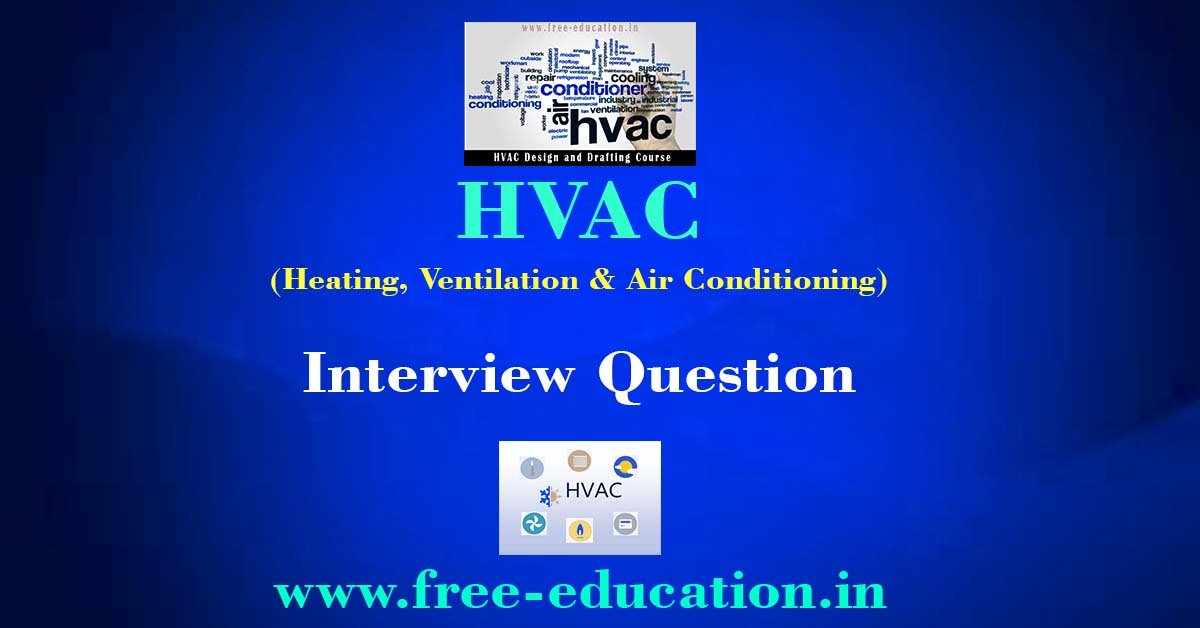Hello friend, are you looking for job in hvac field. if yes, here are some important HVAC interview question for you to boost you confident for hvac engineering job.
if you are a HVAC engineer or a technician looking for an opportunity to boost you chance to get job. free-education.in is here for you.
HVAC Interview Question
Fortunately, most HVAC professionals are looking for similar qualities and skills in an employee, so learning more about the types of questions and problems you’re likely to face during your first job interview can help you give the best possible answers. Read on to learn more about some common interview questions you may be able to expect when applying for jobs in the HVAC industry.
Most Important HVAC Interview Question
#HVAC Interview Question:- 1) What are different types of HVAC System?
HVAC is a short form of Heating, Ventilation and Air Conditioning which purpose is to making the indoor environment habitable comfortable.
HVAC system are four types:-
- Split Heating and Air Conditioning System
- Hybrid Heat split system
- Ductable split heating and air condition system
- Packaged Heating and AC system
#HVAC Interview Question:- 2) What are its limitation?
- Required skill for load calculation and installation
- Cost
- Energy Consumption
- Required high skill and knowledge for economically installation
#HVAC Interview Question:- 3) Application of HVAC
- Residence
- Commercial industry
- Hospitality (Super Specialist)
- Research Center
- Space Research Center
- Chemical industry
- Food preservation etc
#HVAC Interview Question:- 4) What is positive and negative pressure?
:- When your heating, cooling and ventilation system is poorly designed for the space or just not work properly. you can end up with positive or negative air pressure.
If you have a positive pressure problem, the air pressure inside your space is too high and air is being forced out. This pressure can cause doors opening outward to fly open themselves, potentially harming people.It is also means that your expansive cooled air is being wasted as it escape through every tiny opening.
:- In a negative pressure situation, the air pressure inside your space is lower than outside. The pressure difference caused air from outside the space to be sucked in due to which you feel traped in room. For room door open inward it required strength to open.
Due to these, Energy bill is high.
How exactly does air pressure get out of balance
- Hot air rising
- fan motor speed
- Exhaust fan
- Leaky ducts
#HVAC Interview Question:- 5) Where negative pressure should be maintained and why?
Negative room pressure is an isolation technique used in hospitals and medicals centers to prevent cross-contamination from room to room. It includes a ventilation system that generates negative pressure to allow air to flow into the isolation room but not escape from the room.
For Isolation Negative pressure room:-
- Min of 12 air change per hour.
- Doors should be self closing
- Room should be well sealed
- The negative pressure should be exceed the supply by about 30%
- The Bathroom should be negative pressure.
- Exhaust from isolation room should be at least 25 feet from other ventilation intake.
- The exhaust duct should be over sized to allow loss of efficiency.
#HVAC Interview Question:- 6)How to calculate duct size?
For Duct Size, We used ductulator or duct size softwares.
Firstly, there are two method of duct sizing
- Velocity Reduction Method (VRM) or Constant Velocity method
- Friction loss method (FLM) or Equal friction method
For Velocity Reduction method (VRM) we need two entity to calculate the duct sizing. a) Volume (CFM: Cubic feet per minute) b) Velocity (FPM: Feet per minute)
For Friction loss method (FLM) we need two entity to calculate the duct size a) Volume (CFM: Cubic feet per minute) b) Friction loss
#HVAC Interview Question:- 7) What is Ventilation?
Ventilation is the method of introducing fresh air in space and removing old air from a conditioning space.
Process of supply fresh air and removing foul air is called ventilation.
APPLICATION:-
- Car Parking
- Kitchen
- Toilet
Ventilation can be achieved by two methods:-
- Forced (Mechanical) Ventilation
- Natural Ventilation
#HVAC Interview Question:- 8) Where we do need fresh air, is it mandatory?
We need fresh air where the foul air is large like underground basement, kitchen etc where contamination like CO2 large and required fresh air to dilute.
#HVAC Interview Question:- 9) What is local comfort cooling system?
This may be integrated with HVAC provided by a single system. for example AHU (Air Handling Unit) connected to duct work or they may be a combination of separate system for example mechanical ventilation but with radiator for heating and local comfort cooling unit.
Local comfort cooling system (split air conditioning system), It has two unit indoor unit & outdoor unit.
#HVAC Interview Question:- 10) What is Centralized Air system?
Like All Air System

#HVAC Interview Question:- 11) What is constant volume system?
Constant air volume (CAV) is a type of HVAC system.
In simple CAV system, the supply air flow rate is constant, but the supply air temperature varied to meet the thermal loads of a space. Most CAV systems are small and serve a single thermal zone.
#HVAC Interview Question:- 12) What is Refrigerant?
Refrigerant is a substance or mixture usually a fluid used in heat pump & refrigeration cycle. In most cycle it undergoes phase transitions from a liquid to gas and back again.
It is used for transfer the heat from one place to another place in refrigeration cycle.

#HVAC Interview Question:- 13) What is BTU?
The British thermal unit (BTU) is a tradition unit of Heat.
It is defined as the amount of heat required to raise the temperature of one pound of water by 1 degree Fahrenheit.
1BTU = 1055 joule
#HVAC Interview Question:- 14) What types of Air-Conditioning System?
- Window AC
- Split AC (Ducted & Non Ducted Split AC)
- VRV or VRF
- CAV
- Package unit
- DX System
- AHU (All Air System)
- FCU (All Water System)
- AHU + FCU (Air + Water System)
#HVAC Interview Question:- 15) What is By pass factor & Contactor factor?
By pass factor is the percentage of air that pass through a tube of fins without touching fin coil without cool.
Contact factor is percentage of air that pass through a coil by touching the coil and cool down.
#HVAC Interview Question:- 16) What is AHU?
An Air handling unit is used to recondition and circulate air as part of HVAC system. The basic function of the AHU is to take the outside air and recondition it and supply it as fresh air to a building.
#HVAC Interview Question:- 17) Where FCU used?
FCU (Fan Coil Unit) used in Industrial, Commercial & Residential building.
#HVAC Interview Question:- 18) What types of Condenser?
- Water cooled condenser
- Air Cooled condenser
- Evaporative condenser
Water cooled condenser:– a) Shell – Tube condenser b) Shell & Coil Condenser c) Double tube(pipe) condenser
Air cooled condenser: – a) Natural air cooled condenser b) force or mechanical air cooled condenser.
#HVAC Interview Question:- 19) What is Heat Recovery System?
Heat recovery ventilation (HRV) also known as mechanical ventilation heat recovery(MVHR), is an energy recovery ventilation system using equipment know as heat recovery ventilation.
Heat recovery ventilation, also known as mechanical ventilation heat recovery, is an energy recovery ventilation system which works between two sources at different temperatures. Heat recovery is a method which is increasingly used to reduce the heating and cooling demands of buildings.
#HVAC Interview Question:- 20) What types of fans used in HVAC?
- Axial fan
- Centrifugal fan
- Backward inclined fan
- Forward curved centrifugal fan
- Blower
#HVAC Interview Question:- 21) What types of compressor used in HVAC?
- Reciprocating compressor
- Rotary Compressor
- Screw Compressor
- Scroll Compressor
- Centrifugal Compressor
Important Unit Conversion Of HVAC System
Temperature
- F = (9/5 x c) + 32
- C = 5/9 x (F – 32)
TON Of Refrigeration
- 1 TON = 12000 BTU/Hr
- 1 TON = 3.516 KW
- 1 TON = 12 MBH
- 1 TON = 3025.9 Kcal/Min
- 1 TON = 200 BTU/Min
- 1 KW = 3412 BTU/Hr
Flow Of Air
- 1 LPS = 2.119 CFM
- 1 CFM = 1.7 CMH
- 1 CMS = 1000 LPS
- 1 CMS = 2119 CFM
Distance
- 1 M = 1000 MM
- 1 M = 100 CM
- 1 M = 3.28 FT
- 1 M = 39 Inch
- 1 FT = 12 Inch
- 1 Inch = 2.54 CM
- 1 Inch = 25.4 MM
- 1 CM = 10 MM
Top HVAC Conversions For Interviews
- 1 MPM = 3.24 FPM
- 1 CFM = 28.3168 LPM
- 1 CFM = 0.4719 LPS
- 1 FPM = 0.00508 MPH
- 1 CFM = 1.7 CMH
- 1 CMH = 4.4 GPM
- 1 GPM = 3.78 LPM
- 3.1 HP = 0.745 KW
- 1 HP = 9550 Btu/Hr
- 1 HP = 2410 K cal/hr
- 1 HP = 0.8 TR
- 1 TR = 1.25 HP
HVAC Interview Question
Mohd. Sharif Qualification: B.Tech (Mechanical Engineering) [Founder of Wisdom Academy] [Aim Foundation & Free-Education.In] [Engineer By Profession | Teacher By Choice] [Blogger, YouTube Creator]




